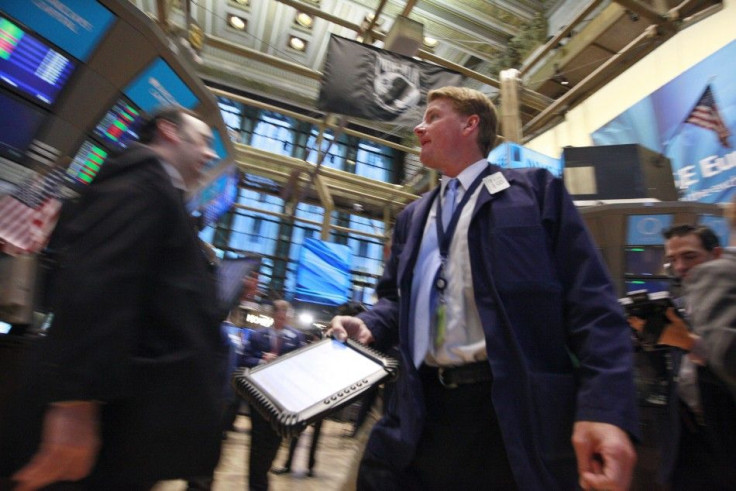Stock Markets Down Around Globe on Euro, China Concerns, Central Bank Exhaustion

Global equities plunged Tuesday as nagging uncertainty about Greece, sobering economic news from China and the realization by traders that European and U.S. central banks might no longer bestow markets with liquidity-boosting largess finally seemed to hit home.
Shortly after 2 p.m. in New York, the S&P 500 and the tech-heavy Nasdaq indexes of U.S. stocks were down 1.6 percent and 1.49 percent, respectively. The broader Russell 2000 Index, which covers most U.S. stocks, was down even further, off 1.93 percent from Monday's close.
The sell-off was largely based on future uncertainty. The VIX index, which goes up when traders' actions in options markets imply higher volatility over the next 30 days, rose by a stunning 14.85 percent, one of the highest day-to-day jumps since last November, when the onset of the euro zone debt crisis caused wild gyrations in the market.
All major S&P sectors were down, with cyclically driven equities classified as belonging to conglomerates, basic materials and capital-goods companies falling most steeply. Non-cyclical stocks and defensive sectors such as health care and utilities didn't sell off as sharply. Interestingly, technology stocks were outperforming the market, with major component Apple Inc., which is set to make a major product unveiling Wednesday, down less than 1 percent.
Stocks were selling off as a result of various developments, mostly long-simmering, that came to the fore in investors' minds Tuesday. In Europe, there is great uncertainty as to whether the Greek government will find private-sector cooperation in swapping out its old-issue sovereign bonds for new European Union-backed ones, for which investors will take a loss in real value of over 70 percent.
We're in this sort of perfect storm where there's a mess of negative news, Adrian Day, president of Adrian Day Asset Management, told the Wall Street Journal. None of it, by itself, is surprising, but the fact that we're getting so much over the last couple of days has reinforced the market's main worries: first is Europe, and whether it will hold together; next is global growth, of which China is a major part.
The China issue mentioned by Day refers to a recent report from Beijing that saw growth in the country's gross domestic product continuing to slow.
Further weighing on equities: statements Monday from Federal Reserve Bank of Dallas President Richard Fisher that indicated a hawkish view of U.S. central bank policy, suggesting further monetary easing might not be forthcoming from the Fed. There is also a general view that the European Central Bank might have exhausted its arsenal of short-term liquidity fixes during its latest round of cash-for-clunkers bond purchasing. Its balance sheet has recently swelled to nearly $4 trillion.
The U.S. situation followed a day of turbulent market actions overseas. The Shanghai Stock Exchange composite index closed 1.38 percent down for the day. Hong Kong's Hang Seng Index saw an even sharper nose-dive, of 2.16 percent.
Stock markets across Europe plunged even more. Indexes shaved more than 3 percent off their quoted value in Vienna, Frankfurt, Brussels, Paris and Oslo. Russia's ruble-denominated Micex closed down 4.37 percent, on stability concerns following Monday's post-election street protests in Moscow. The euro was off over 70 basis points in afternoon trading in New York, selling off to trade at $1.3105, having touched the $1.31 mark earlier Tuesday
The U.K. FTSE 100 Index wasn't down as sharply as other European market measures, but it still weakened 1.86 percent at closing. The British pound lost more against the dollar than European peers in the foreign-exchange market, down 98 basis points to 1.5705.
In fact, all major world currencies, with the notable exception of the Japanese yen, were down against the U.S. currency, as investors fled to relatively safer dollar-denominated assets.
Ironically, the market in the country at the epicenter of the current global financial crisis ended the day on a positive note. The Athens Stock Exchange General Index, which closed at an all-time low of 625.35 on Jan. 10 -- it had traded at levels over 5,000 in 2008 -- is experiencing something of a dead-cat bounce and was up 2.77 percent.
Trading concurrently with American equity markets, Mexican, Argentinean and Brazilian stocks all saw big losses, with Sao Paolo's IBOVESPA Index down the most, 2.83 percent.
© Copyright IBTimes 2024. All rights reserved.











